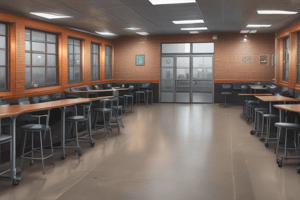Podcast
Questions and Answers
According to the Salem Police Department's policy, what balance should officers strive for when dealing with juvenile detainees?
According to the Salem Police Department's policy, what balance should officers strive for when dealing with juvenile detainees?
- Prioritizing the juvenile's acceptance of responsibility while being sympathetic to their health and safety needs. (correct)
- Strict punitive measures and complete family separation to deter future delinquency.
- Focusing solely on the safety needs of the public above all other considerations.
- Ensuring minimal contact with the home community to avoid negative influences.
Under what circumstances should the separation of a juvenile from their parents occur, according to the policy?
Under what circumstances should the separation of a juvenile from their parents occur, according to the policy?
- When the parents are suspected of contributing to the juvenile's delinquent behavior.
- As a standard procedure, to ensure the juvenile understands the seriousness of their actions.
- Whenever there is any indication of potential delinquent behavior.
- When it is clearly necessary for the juvenile's welfare or public safety, and a change in custody will benefit the juvenile. (correct)
What is the crucial difference between a 'Status Offender/CHINS' and a 'Delinquent' as defined in the general order?
What is the crucial difference between a 'Status Offender/CHINS' and a 'Delinquent' as defined in the general order?
- A Status Offender requires mandatory detention, while a Delinquent is released to their parents immediately.
- A Status Offender has committed a violent crime, while a Delinquent has committed a non-violent crime.
- A Status Offender is under 16 years of age, while a Delinquent is between 16 and 18 years of age.
- A Status Offender has committed an offense that would not be a crime if committed by an adult, while a Delinquent has committed an offense that would be a crime if committed by an adult. (correct)
A 17-year-old is caught smoking cigarettes. According to the general order, how is this juvenile to be charged?
A 17-year-old is caught smoking cigarettes. According to the general order, how is this juvenile to be charged?
What immediate action should an arresting officer take after taking a delinquent child into custody?
What immediate action should an arresting officer take after taking a delinquent child into custody?
What is the procedure for handling juveniles arrested by the Salem Police Department who require medical treatment?
What is the procedure for handling juveniles arrested by the Salem Police Department who require medical treatment?
What is the primary intention behind processing the juvenile quickly and minimizing their in-custody period?
What is the primary intention behind processing the juvenile quickly and minimizing their in-custody period?
According to the policy, what separation must be maintained regarding juvenile detainees and adult offenders?
According to the policy, what separation must be maintained regarding juvenile detainees and adult offenders?
If there is reason to believe that a juvenile has been abused or neglected, what action must be taken according to the policy?
If there is reason to believe that a juvenile has been abused or neglected, what action must be taken according to the policy?
Where should a child taken into custody solely as a Status Offender/CHINS be held?
Where should a child taken into custody solely as a Status Offender/CHINS be held?
After how many hours must the court be notified if a juvenile alleged to be delinquent has not been released?
After how many hours must the court be notified if a juvenile alleged to be delinquent has not been released?
What is the maximum time a juvenile can be held prior to being transferred to a certified detention facility, if the court determines continued detention is required?
What is the maximum time a juvenile can be held prior to being transferred to a certified detention facility, if the court determines continued detention is required?
When is it permissible to securely detain a juvenile alleged to be a Status Offender/CHINS?
When is it permissible to securely detain a juvenile alleged to be a Status Offender/CHINS?
What form must be filled out prior to releasing the juvenile?
What form must be filled out prior to releasing the juvenile?
To whom can juveniles be released?
To whom can juveniles be released?
What specific documentation in the IMC arrest report indicates the arrestee is a juvenile?
What specific documentation in the IMC arrest report indicates the arrestee is a juvenile?
After a delinquent case is submitted to the juvenile inbox, who reviews it?
After a delinquent case is submitted to the juvenile inbox, who reviews it?
According to the document, who is the final authority on how to proceed with cases referred by petition?
According to the document, who is the final authority on how to proceed with cases referred by petition?
Within what time frame must a referral to CANS (Child Adolescent Needs and Strengths) occur after the arrest of a New Hampshire resident juvenile?
Within what time frame must a referral to CANS (Child Adolescent Needs and Strengths) occur after the arrest of a New Hampshire resident juvenile?
Which of the following factors should the prosecutor consider when deciding how to proceed with a delinquency case, while balancing the goal of rehabilitation?
Which of the following factors should the prosecutor consider when deciding how to proceed with a delinquency case, while balancing the goal of rehabilitation?
Flashcards
Status Offender/Child in Need of Services (CHINS)
Status Offender/Child in Need of Services (CHINS)
A juvenile who has committed an offense that would not be a crime if committed by an adult.
Delinquent
Delinquent
A person under 18 who has committed an offense that would be a felony or misdemeanor if committed by an adult.
Initial Contact Procedure
Initial Contact Procedure
The agency must contact the juvenile's parent/guardian and ascertain their ETA.
Delinquent Detention Time Limit
Delinquent Detention Time Limit
Signup and view all the flashcards
Use of Restraints on status offender/CHINS
Use of Restraints on status offender/CHINS
Signup and view all the flashcards
Supervisor's role in juvenile cases
Supervisor's role in juvenile cases
Signup and view all the flashcards
Referral to CANS must occur
Referral to CANS must occur
Signup and view all the flashcards
Purpose of ICJ Rules 6-103A
Purpose of ICJ Rules 6-103A
Signup and view all the flashcards
Purpose of ICJ Rule 6-103
Purpose of ICJ Rule 6-103
Signup and view all the flashcards
Study Notes
- The Salem Police Department General Order addresses the detention of juveniles, aiming to control juvenile delinquency and provide temporary supervision for juveniles awaiting parents, court hearings, or placement
- The policy is to deal with juvenile detainees by is targeting juvenile delinquency while being sensitive to the juvenile's health and safety needs and that of the public, and promote the juvenile's acceptance of responsibility
Definitions
- Status Offender/Child in Need of Services (CHINS): A juvenile who commits an offense that would not be a crime if committed by an adult, such as running away, truancy, disobeying parents, or exhibiting conduct that would be a violation under the criminal code if committed by an adult
- Delinquent: A person under 18 who commits an offense that would be a felony or misdemeanor if committed by an adult, violates RSA 318-B-2-c, II or III, and is found to need counseling, supervision, treatment, or rehabilitation
Exceptions for Delinquent
- A minor under 18 will be charged as an adult for specific offenses as outlined in RSA 169-B:32 and 169-D:22
- Including motor vehicle laws (Title XXI), aeronautics law (Title XXXIX), navigation of boats (Title XXII), fish and game laws (Title XVIII), alcoholic beverage laws (Title XIII), and fireworks laws (RSA 160-B or RSA 160-C) committed by a person over 16 years of age
- Also includes any town or municipal ordinance with a penalty not exceeding $100 committed by someone over 16 and laws relating to tobacco products by a person over 12 (RSA 126-K)
- A child taken into custody for any of the above offenses, who is below the required minimum age, is released to a parent, legal guardian, or responsible adult
Procedure
- When a delinquent child is taken into custody, the arresting officer attempts to contact the juvenile's parent/guardian and find out their ETA
- Delinquent children are transported to the Temporary Detention Facility for processing without delay unless emergency medical treatment is needed
- Juveniles are kept separate from adult offenders
- All delinquent arrests require an arrest report submitted to Investigations within 48 hours, fingerprints, and a booking image
- DCYF must be notified immediately via phone and written report if there is reason to believe the child has been abused or neglected, and the Abuse and Neglect Hotline is 1-800-894-5533
- A child taken into custody as a CHINS or Status Offender is never held in a cell or locked room and is walked into the Temporary Detention Facility through a common entrance
Detention of Juveniles Awaiting Release
- Juveniles alleged to be delinquent may be secured in juvenile holding cells to await release
- When a juvenile is secured, the arresting officer must document the IMC arrest report and the reason for detention
- The release details about the juvenile, including the date, time, and person to whom they were released, must be documented in the IMC arrest report
- Juvenile lock-up information is provided to the New Hampshire Department of Health and Human Services per RSA 169-B:15-a twice annually or upon request
- The court must be notified if a juvenile has not been released after four hours
- The court determines placement, and if continued detention is required, the juvenile can be held for up to six hours before transfer to a certified facility
- The Salem Police Department is not a certified juvenile detention facility
- For juveniles pending arraignment, the Shift Commander seeks detective assistance via the Detective Sergeant before contacting the hotline
- The arresting officer/detective must complete the Detention Assessment Screening Instrument (NHJB-2581-DF) from Power DMS>Forms or the AOC website before calling the Juvenile Justice Services Hotline at 1-888-230-0606
- An officer, connected with a JPPO Supervisor, assists in completing the Detention Assessment Screening Instrument to find placement at the Sununu Youth Services Center
- A juvenile alleged to be a Status Offender/CHINS can never be securely detained in a locked area, including a holding cell and should not be brought through the Temporary Detention Area/Booking room, but through another entrance
- If a Status Offender/CHINS remains in custody, standard time limits apply
- If a juvenile commits an act while in custody as a Status Offender/CHINS that would be a crime if committed by an adult, procedures for detaining a delinquent juvenile apply
Release of Juveniles
- A Juvenile Release Form will be completed, signed by the person taking custody, who must provide identification before the juvenile’s release
- Juveniles can only be released to a parent or court-appointed guardian, or with court approval to another person if a parent or guardian cannot be located
Documentation and Referral
- The arresting officer documents the delinquent's arrest in an IMC arrest report, marking the 'Is the arrestee a juvenile?' and ‘Juveniles Involved?' boxes
- The case file is maintained in a blue folder, approved by a supervisor, and submitted to Records
- The supervisor ensures the case is forwarded to the Juvenile Unit
- The detention of a Status Offender/CHINS is documented in an IMC offense report with the ‘Juveniles Involved' box checked
- The case file is kept in a blue folder (if applicable), approved by a supervisor, and submitted to Records
- The Detective Sergeant reviews all cases submitted to the juvenile inbox and delinquency cases are forwarded to a detective for review
- Detectives may file delinquency petitions, who may proceed on a delinquency petition to juvenile court upon consulting with Prosecution
- The detective, with the Detective Sergeant's approval, may choose not to forward a case for a delinquency petition
Cases Referred by Petition
- The prosecutor decides how to proceed
- For New Hampshire residents, the case is sent to Child Adolescent Needs and Strengths (CANS) before filing a delinquency petition
- The report and potential charges are sent to a Juvenile Probation Assessment Officer for assessment within 30 days
- The Detective or Prosecutor decides to accept or deny the recommendations, and referral to CANS must occur within 48 hours of arrest
- The prosecutor files the petition and proceeds in juvenile court if CANS advises filing petitions or the agency overrules the CANS assessment, and out-of-state residents do not need a CANS assessment
- The case may be held until the offender turns 18, with charges filed in adult court according to RSA 169-B:4, VIII, if the statute of limitations allows
- Seeking certification of the delinquent as an adult per RSA 169-B:24
- Sending the case into diversion, but filing the petition or sending a CANS referral if the juvenile fails diversion
- Only New Hampshire residents may be sent to diversion, and delinquent children from out of state may enter a non-prosecution agreement
- The prosecutor considers the offender's age and competency, history, presence of a victim or restitution needs, and the crime's sophistication, level of violence/weapons, and gang activity when deciding how to proceed
Interstate Compact on Juveniles
- The agency follows guidelines of the Interstate Commission for Juveniles (ICJ) under RSA169-A
- For a delinquent escapee, absconder, or accused delinquent from another State taken into custody, the agency follows ICJ Rule 6-103A: Non-Voluntary Return of an Escapee, Absconder, or Accused Delinquent
- In the case of a Runaway or Status Offender wanted for return to another State, the agency abides by ICJ Rule 6-103: Non-Voluntary Return of Runaways and/or Accused Status Offenders
RULE 6-103A: NON-VOLUNTARY RETURN OF AN ESCAPEE, ABSCONDER OR ACCUSED DELINQUENT
- Requisition applies to all juveniles in custody who refuse to return to their home/demanding state or to request a juvenile whose whereabouts are known, but not in custody, be picked up and detained pending return
- Probation/parole escapees, absconders, or accused delinquents who have been taken into custody on a warrant are detained in secure facilities until returned
- The demanding state's ICJ Office maintains regular contact to ensure accurate preparation and timely delivery of documents
- The demanding state presents a Form II Requisition for Escapee, Absconder, or Accused Delinquent, requesting the juvenile’s return, within 60 calendar days of notification of the refusal to voluntarily return
- This requisition must include a verified affidavit and copies of supporting documents that show entitlement to the juvenile, such as judgment, adjudication, order of commitment, petition of delinquency etc
- When the court orders the juvenile's return, they sign the Form II Requisition for Escapee, Absconder, or Accused Delinquent
- This documentation is forwarded to the demanding state's ICJ Office which ensures it is in order, submits it through the electronic data system, and grants the holding state the right to request original or certified copies of legal documents
- The ICJ Office in the holding state forwards the Form II Requisition to the appropriate court, requesting a hearing within 30 calendar days of receipt
- The court notifies the juvenile of the demand, offering counsel or a guardian ad litem, to determine proof of entitlement
- An order is issued immediately to both the holding and demanding states' ICJ Offices, detailing either denial or consent
- Juveniles held for non-voluntary return may be detained for a maximum of 90 calendar days
- The demanding state returns requisitioned juveniles within five business days, potentially extended by another five with ICJ approval
RULE 6-103: NON-VOLUNTARY RETURN OF RUNAWAYS AND/OR ACCUSED STATUS OFFENDERS
- A requisition applies to all juveniles in custody who refuse to return or who have left the state with permission but failed to return
- Runaways and accused status offenders in custody who are a danger to themselves or others must be detained in secure facilities
- The holding state can hold other runaways and accused status offenders at a location it deems appropriate
- The home/demanding state's ICJ Office maintains contact with authorities to ensure accurate document preparation and minimize detention time
- The legal guardian or custodial agency must petition the home/demanding state court for a requisition within 60 days if the juvenile is already in custody
- The petitioner may use Form A, Petition for Requisition to Return a Runaway Juvenile, stating the juvenile's name, birthdate, the petitioner's data, location, and endangerment status
- This petition must be verified by affidavit and include certified copies of custody documents
- After approval, the court signs Form I Requisition for Runaway Juvenile, forwarding it with documentation to the home/demanding state's ICJ Office
- When the Form I Requisition is received by the home/demanding state’s ICJ office, it is submitted through the electronic data system to the ICJ Office in the holding state, who may request original or certified documents
- The ICJ Office in the holding state forwards the Form I Requisition to the appropriate court, requesting a hearing within 30 calendar days of receipt, extended by approval of both ICJ Offices
- The holding state court informs the juvenile, potentially appointing counsel or a guardian ad litem, to determine proof of entitlement
- A court order is issued immediately to both the holding and demanding states’ ICJ Offices
- Juveniles held for non-voluntary return may be detained for a maximum of 90 calendar days
- The home/demanding state must return juveniles within five business days, potentially extended up to an additional five with ICJ Offices approval
- If the legal guardian/custodial agency cannot initiate the requisition, the home/demanding state's appropriate authority initiates the process.
Studying That Suits You
Use AI to generate personalized quizzes and flashcards to suit your learning preferences.






